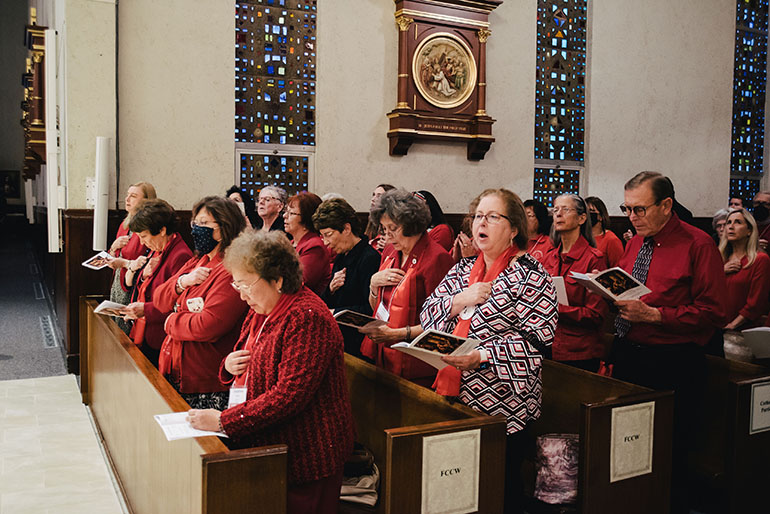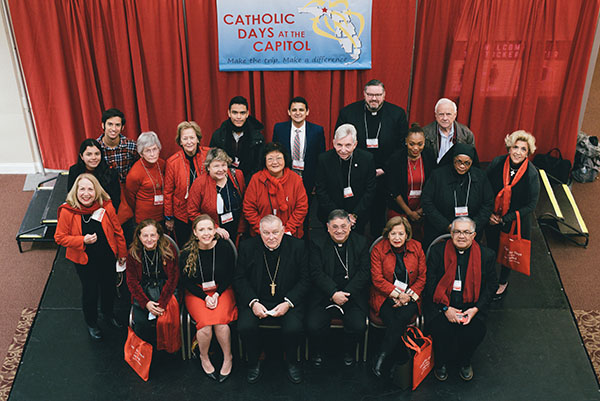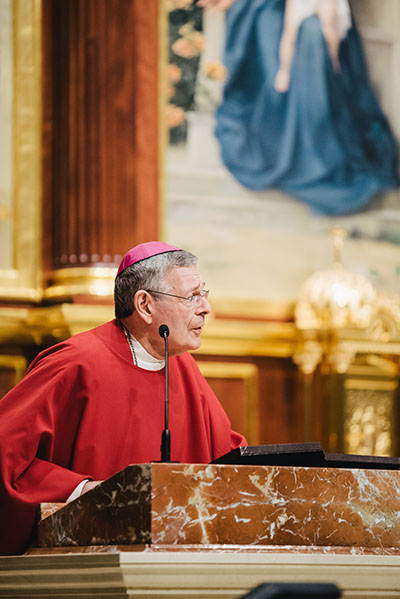By Jean Gonzalez - Florida Catholic - Orlando

Photographer: David Edscor | Aperture Horizons
Participants of the Catholic Days at the Capitol participate in the 47th annual Red Mass Feb. 2, 2022, which was celebrated at the Co-Cathedral of St. Thomas More in Tallahassee. The event closes the Catholic Days at the Capitol.
ORLANDO | After a virtual Catholic Days at the Capitol in 2021, Michele Taylor found comfort in the familiar feeling of Catholic constituents returning to Tallahassee to advocate personally to legislators on issues of importance to the Catholic Church.
Sure, it is a busy time for the associate director for communications at the Florida Conference of Catholic Bishops and the rest of the staff in Tallahassee. But any normalcy at a time when the pandemic is still a part of everyday life is welcome.

Photographer: David Edscorn | Aperture Horizon
The delegation from the Archdiocese of Miami pose for a group photo with Archbishop Thomas Wenski, bottom row, third from left, and Auxiliary Bishop Enrique Delgado following a breakfast Feb. 2, 2022, at Catholic Days at the Capitol. Traditionally, participants wear red during the event held in Tallahassee, which closes with an annual Red Mass.
“Despite not being able to participate in person at last year’s event, advocates haven’t missed a beat,” Taylor said. “The enthusiasm of this year’s Catholic Days participants is just as inspired, faith-filled and dedicated as in years past.”
Each year during the legislative session, Catholics from across Florida gather in Tallahassee to put their faith and civic responsibility into action at Catholic Days at the Capitol. The two-day event, held Feb. 1-2, 2022, offers participants the opportunity to see the legislative process in action. More than 200 Catholics from Florida’s archdiocese and six dioceses participated in the annual event.
On Feb. 2, they shared a breakfast with Florida’s bishops and legislators, and later each delegation took a group photo with their bishop. A highlight of the event is the 47th annual Red Mass of the Holy Spirit, which was concelebrated by Florida’s bishops Feb. 2, to pray for those working in the legislative, judicial and executive branches of government. The homily was offered by Bishop Gerald M. Barbarito of Palm Beach.
Before participants talk with their respective legislators (Florida House representatives and Florida senators) in individual meetings, the conference offers a legislative briefing that focuses on four bills that could serve as discussion points. Its backgrounders also offer responses to possible objections legislators might raise to explain their opposite stance on a bill.
DEATH PENALTY
With Florida being the national outlier in a high number of death sentences, executions, death row population and death row exonerees, participants urged legislators to support Senate Bill 770/House Bill 1251, which bars applying the death penalty for individuals with serious mental illness. Citing the alternative of life without the possibility of parole, the conference explained it is unnecessary to apply the death penalty to the seriously mentally ill.
In its objections and responses section, the conference dispelled familiar myths related to the death penalty, including that the death brings closure to murder victims’ family members, even though many murder victims’ family members have publicly expressed that the years of litigation and uncertainty exacerbates their grief.
Another possible objection dealt with legislators who might believe this bill is unnecessary because defendants could use the insanity defense and not be convicted of a crime. In response, the conference explained the bill could still allow a mentally ill defendant to be judged guilty of a charged capital offense.

Photographer: David Edscor | Aperture Horizons
Bishop Gerald M. Barbarito served as homilist for the 47th annual Red Mass held at the Co-Cathedral of St. Thomas More in Tallahassee Feb. 2, 2022.
“While the insanity defense allows a jury to find a defendant not guilty due to insanity, the defense is not often used at trial due to difficulties in convincing a jury by clear and convincing evidence that the defendant was insane,” the conference explained through the backgrounder. “This bill would prevent the death penalty from being applied to a mentally ill defendant altogether before trial starts and would place the responsibility for the determination in the purview of the judge.”
ABORTION LIMITS
Advocates were encouraged to ask their legislators to support Senate Bill 146/House Bill 5, which prohibits abortion after 15-weeks gestation. According to the bills, exemptions would include: if the procedure would allow doctors to save the life of the mother; if it were to avoid an irreversible and substantial impairment of a major bodily function of the mother; and if two physicians determine that a pre-viable fetus has a fatal fetal abnormality. The bills also require the creation of review committees to study fetal and infant mortality in Florida; protect unborn children from tobacco exposure by requiring education of pregnant women and women who may become pregnant about the health risks of tobacco; and require monthly mandatory reporting of the number of medication abortions.
A backgrounder offered by the conference outlined how the bill would “align Florida law with what will likely be federally allowed.” The backgrounder goes on to explain how this Florida bill closely mirrors the Mississippi law at issue in Dobbs v. Jackson Women’s Health Organization, and “it is prudent to track the Mississippi law because it stands a good chance of being upheld. This bill would go into effect after the Supreme Court ruling is expected.”
On Feb. 2, 2022, the Florida Senate Health Policy Committee heard and passed Senate Bill 146 out of committee, along party lines.
HELP ACT
HELP stands for Healthcare Ethics and Liberty Protections, and is addressed in Senate Bill 1820/House Bill 727. Participants were asked to urge their legislators to support conscience protections for healthcare providers so that workers and entities are not forced to provide services they find objectionable on ethical, moral or religious grounds.
According to the conference’s backgrounder, “the freedoms of conscience are foundational rights protected by the U.S. Constitution,” and Florida statutes such as 390.0111, 381.0051, 922.105, and 765.1105 currently provide conscience protections for healthcare workers in the areas of abortion, family planning, death penalty executions and end-of-life directives, respectively.
“The bill promotes pluralism,” the backgrounder continued, “and allows Catholic individuals and institutions to more fully witness to our faith in the medical profession.”
In its “likely arguments and responses” section, the conference explained how the HELP act would not prevent people from receiving needed healthcare, as current Florida law requires emergency, lifesaving treatments must always be provided. Nor does the act serve to discriminate individuals based on race, color, sex or any protected characteristic. What the HELP Act offers is conscience protections for healthcare workers and entities in elective care, not emergency intervention.
VPK FUNDING
According to the conference, Florida’s Voluntary Prekindergarten (VPK) Program is one of the state’s most popular school choice programs. Yet, funding for the program has seen a net decrease over the course of the program’s 17 years. Compared to the program’s first year in 2006, current funding is about $14 less per student, and since 2009 funding has seen an overall decrease of 8% per student.

Photographer: David Edscor | Aperture Horizons
Prior to the 47th annual Red Mass held at the Co-Cathedral of St. Thomas More, the bishops of Florida posed for a photo. They include, Bishop John Noonan of Orlando, left, Bishop Felipe Estevez of St. Augustine, Archbishop Thomas Wenski of Miami, Bishop Gerald M. Barbarito of Palm Beach, Bishop Enrique Delgado, auxiliary bishop of Miami, and Bishop William Wack, CSC, of Pensacola-Tallahassee. The bishops joined members of their respective dioceses to participate in Catholic Days at the Capitol Feb 1-2, 2022.
This is a concern for the Catholic Church because Catholic early learning centers and preschools represent the largest system of faith-based VPK providers in Florida. During the 2020-2021 school year, there were 132 Catholic schools in Florida serving 2,880 VPK students. For the 2021-2022 school year, the base student allocation is $2,486 (about $4.63 per hour). Catholic Days participants were asked to urge their legislators to support VPK reform by increasing the VPK base student allocation by 25% to $3,107.50.
Legislators could object to the program by stating Florida and other states should not be supporting religious schools, and that the Florida Constitution contains an amendment that prohibits state financial aid to religious institutions. In response, the conference offers the ruling of the U.S. Supreme Court in Espinoza v. Montana Department of Education, which outlines if a state has a “school choice program (similar to the programs in Florida) then that state cannot prohibit families from using scholarship funds at a religious school.”
And if a legislator asks if there is enough value in VPK programs to justify increased spending, advocates could respond by stating how children who attend pre-k programs are better prepared for kindergarten at the end of their pre-k year.
“Currently, Florida is 42nd out of 50 states in per-pupil funding,” the conference backgrounder explained. “As the third most populous state, it’s time for Florida to increase early learning funding to ensure program quality.”
Photography for Catholic Days at the Capitol was provided by David Edscorn of Aperture Horizons Photography in Tallahassee. For more information, visit a-horizonsphotography.com.

